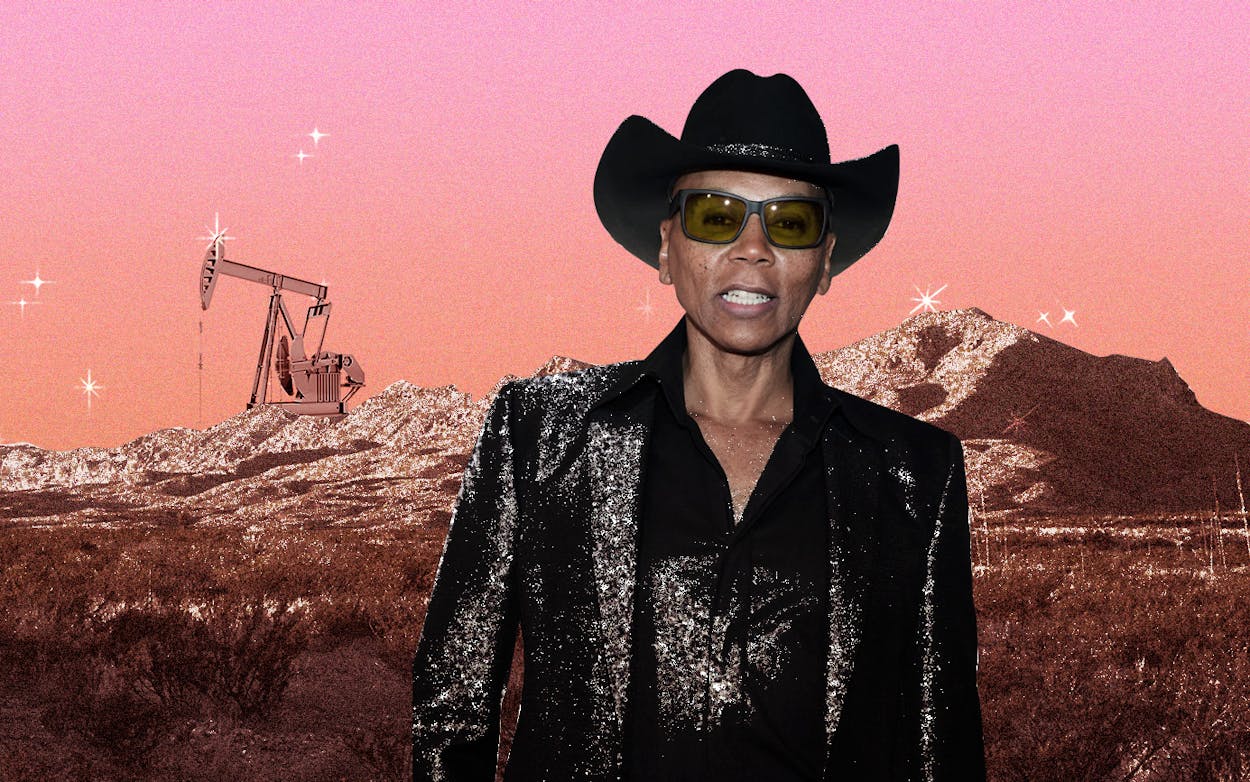As millions of Americans bought rolls of toilet paper and cans of beans in preparation for two-plus weeks of self-quarantine, RuPaul Charles, the venerable drag queen and host of RuPaul’s Drag Race, joined Terry Gross for an NPR Fresh Air interview, in turn making an unexpected declaration that has reverberated across the internet for days.
About thirty minutes into the interview, Gross—who is one of the most celebrated interviewers on national radio—asked RuPaul about the land that he and his husband own in Wyoming and South Dakota; it comprises 60,000 acres.
“That’s like a national park,” Gross remarked in disbelief. “Yeah, it’s a lot!” RuPaul agreed before explaining that no, he doesn’t own cattle or livestock—in the twenty-first century, it’s all about “land management.” If you’re an environmentalist, your ears might have perked up: RuPaul is apparently leasing his mineral rights and water to oil companies in Wyoming—a state with some of the largest natural gas reserves in the country.
It seems that Gross didn’t pick up on the significance of his explanation, turning the conversation instead to how Charles tolerates being out in the middle of nowhere to manage the ranch land. (The answer: meditating.) But one intrepid listener put the pieces together. “I was doing the dishes while listening to the story in the background,” says Rory Solomon, a PhD candidate in media studies at New York University. The mention of oil companies leasing land in Wyoming piqued his interest. “I dried my hands and thought I’d tweet about it, but decided to do a little fact-checking before spreading rumors.”
In a tweet that’s since been retweeted more than seven thousand times, Solomon posted two screenshots. One denoted the location of RuPaul and his partner’s 60,000-acre ranch; the other marked the location of fracking wells in that same area.
RuPaul, it turns out, seems to be fracking. A lot. There appear to be at least 35 active wells on his property, according to research from the publication Earther. And at least one company reportedly working with RuPaul is based in Texas: Anadarko, a subsidiary of Occidental Petroleum, has its roots in The Woodlands. In Texas last year, Anadarko produced more than 27 million barrels of oil and more than 144 million cubic feet of natural gas, primarily in Loving County, which sits against the New Mexico border. Anadarko has, in years past, spent millions of dollars to sway public opinion in states considering fracking bans, like Colorado. (Anadarko and RuPaul did not reply to a request for comment.)
While this might not be surprising to some—RuPaul is unapologetically capitalistic with his drag empire, after all—it’s more than just celebrity gossip for idle and quarantined minds. The fact that RuPaul appears to have a fracking empire, too, has significant implications. As the global economy prepares to take a hit because of the coronavirus pandemic, the price of oil has plummeted—leading some to speculate that the federal government will have to bail out the oil and gas industry, despite the fact that these companies have made staggering profits in the past. When Occidental acquired Anadarko in a $38 billion deal last year, the CEO of Anadarko received a payout of $98 million, according to the Wall Street Journal.
Of course, the question of climate change also lingers. Fracked natural gas is cheap, and slightly less carbon-intensive than other fossil fuels like coal—so much so that politicians consider it a “bridge fuel” toward building a completely renewable power grid. But natural gas releases tons of methane as a byproduct—literally, tons. Methane is an even more powerful driver of climate change than carbon dioxide, but the Texas Commission on Environmental Quality doesn’t regulate the gas at all. On top of that, last summer the federal government proposed scrapping its regulation on methane emissions altogether. What’s more, Anadarko, like almost all oil companies, has spent millions of dollars in the past few years lobbying the federal government for more favorable regulations. The company, for its part, says its “climate strategy is to limit emissions of methane and other greenhouse gases.”
As Solomon notes, RuPaul is just one of many celebrities who has claimed Wyoming as a second home, with some supplementing their income with royalties from oil and gas operations. Income inequality levels in some parts of Wyoming match that of some small Texas oil towns, as well, where CEOs reap millions from an extractive and environmentally damaging industry. It’s one thing for an oil and gas CEO to take to the radio and celebrate the beauty of nature in rural parts of the country. But for a celebrity who has at least paid lip service to climate change before, and one whom many look up to particularly when it comes to LGBTQ issues, Solomon says it’s more than disappointing.
“RuPaul has thrown a climate ball on his show,” says Solomon. “So it’s deeply hypocritical to participate in fracking.”






